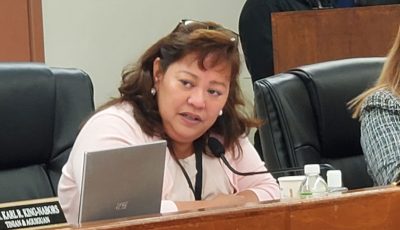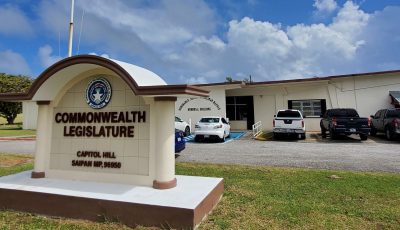Finance provides clarification on FY 2019 deficit
After further analysis from the Department of Finance and the Legislative Bureau on the FY 2019 Annual Report to the Legislature, Finance Secretary David DLG. Atalig provided additional clarification on the CNMI’s financial state, which was negatively impacted in the last year by a recovering economy reeling from a severe natural disaster.
“It is important that we view the CNMI’s financial state in the context of the reality of [fiscal year] 2019, which was dramatically different than past years,” said Atalig. “The announcement of [fiscal year] 2019’s deficit speaks to the transparency that this administration seeks to provide to the public, but it is apparent, that there are some who wish to convolute the present situation.”
In his revised report to the Legislature, Atalig said that fiscal year 2019 started the year with the unanticipated and devastating shutdown of the CNMI economy due to Super Typhoon Yutu, significantly affecting economic activity in the first quarter of fiscal year 2019.
“The report was adjusted to conform to the governmental accounting standard of modified accrual. Expenditures are accrued when they are expected, such as the budgeted allotments and earmarks to autonomous agencies. In our report, we made an adjustment of $9,260,566 to record expenses for unpaid allotments in operating transfers. The correct deficit amount is approximately $88 million from the earlier reported amount of $98 million.”
The following are the reasons for the adjustments:
• Payables due to MVA were included as part of total expenditures, in error, as these expenditures were previously calculated in the earmark portion of net budgetary resources.
In other words, it was factored in twice in the report. A reduction of $4,950,126 will be adjusted on total spending of budgetary resources.
• Payments and obligations to autonomous agencies were double-recorded in the December report. A reduction of $4,347,346 will be adjusted on total spending of budgetary resources.
The breakdown of the deficit is as follows (rounded to the nearest million):
• Disaster recovery costs (including law enforcement response) – $49 million
• Medical referral – $15 million
• Law enforcement operations – $3 million
• Other operational costs – $5 million
This is a total of about $72 million in underbudgeted expenses during fiscal year 2019. Moreover, the CNMI was short $16 million in revenue projection due to the loss of economic activity throughout the year, bringing the overall deficit to $88 million.
He noted that administering public finances during a disaster recovery period is one of the most complex challenges for any local or state government.
“$49 million over expenditure on disaster appropriation speaks to the severity of the disaster and the need for immediate government support to ensure the safety of our community. These expenses were necessary, unappropriated and large, but are anticipated to be reimbursed through the [Federal Emergency Management Agency] reimbursement process,” he said.
The Finance secretary added that the bulk of the deficit, which was recovery spending subject to reimbursement, was not the result of excessive government overspending.
“Disasters are a problem in two parts. It requires significant upfront expense from our general fund, and it causes a temporary loss of economic activity and revenue. Speaking to the second part of our financial problems, the CNMI government was short of its revenue projections by $16 million in 2019. Already, these factors contribute to 70 percent of the deficit.”
Atalig noted that the remaining deficit amounts represent longstanding policy concerns that require legislative action to assist in alleviating.
“The persistent deficit spending on Medical Referral, which, to be clear, happens every year because of the various needs of our community, places the administration in a position of either exceeding the statutory appropriation or denying essential healthcare services to our people.”
“Members of the Legislature who have voiced concern of the deficit supported the recent statutory provision that permitted the government to continue to provide services in this critical area, even if it goes over budget.”
“While this administration and the Medical Referral Office is continuing the hard work of instituting changes to reduce overall costs associated with off-island treatment of critical conditions, this deficit will continue to grow if responsive action by the Legislature is not taken.”
Atalig also discussed the overtime costs of law enforcement officers, which made up another recurring item of the deficit.
“Similarly, the government is placed in a difficult situation relating to the essential services provided by law enforcement personnel. The demands of public safety and the proper protection of life and property provided by the CNMI government cannot be sacrificed for the ‘under allocation’ of overtime payments by the Legislature.”
“These expenses would not be as dramatic if the CNMI government had sufficient resources and revenue from a growing economy. That is why economic development and the support of revenue generating policies from all members of the Legislature is crucial.”
“It is a disservice to every resident of our islands when others choose to criticize government deficits, expect consistent government services, and hinder the private sector from realizing success in our Commonwealth.”
Gov. Ralph DLG Torres and Lt. Gov. Arnold I. Palacios added that working together to provide collective solutions to the collective problems facing our Commonwealth should be the way forward, instead of throwing rocks from the sideline without full context of a challenging 2019.
“To the members of the Legislature concerned with the current financial situation, it is crucial to the advancement of our islands to be truthful in the assessment of responsibility. We, as leaders in the government, all share in the responsibility to ensure the allocation of resources and the provision of services provides for the needs of our people.”
“Deficits occur in government spending in a challenging economic year in order to meet the needs of our people. Whether it be medical referral or overtime costs, we have a fundamental duty to provide the service so that a family can seek the off-island treatment they need and a law enforcement officer can receive compensation in a demanding job. It is the job of the Legislature to fund services, and the job of the administration to administer them. We have done our very best to reduce overtime costs and to reform our medical referral system through our own cost-containment measures, which saved the government $15 million last year.”
“Despite these challenges in 2019, this administration continues to be on time in its Settlement Fund payments to ensure the pensions of our retirees.
Failure to make payments to the Settlement Fund would have resulted in the CNMI going into receivership and an even worse financial condition.
“Our retirees’ benefits have not been reduced at all, and we will continue to fulfill that priority.
“Politics and lengthy absolutions of blame may be helpful to their cause in the short-term, but truly committing to understand the facts, and taking the hard, but necessary steps to provide solutions is what we should aim to achieve.
“If members of the minority are interested in better understanding the complexity of managing government finances in this environment and the ways in which government relies on private sector growth to provide services, we welcome them to speak with us and our team.” (PR)



























